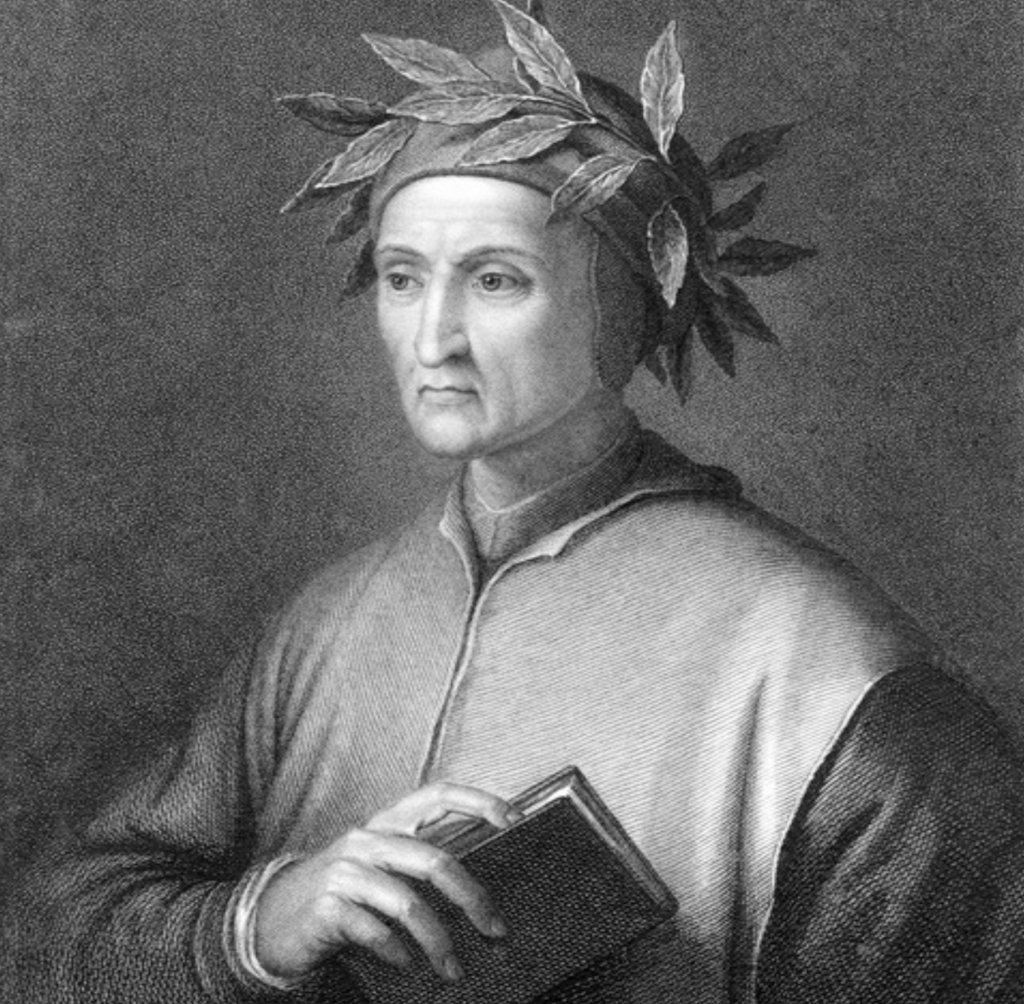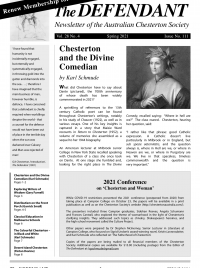What did Chesterton have to say about Dante (pictured), the 700th anniversary of whose death has been widely commemorated in 2021?
A sprinkling of references to the 13th century Catholic poet can be found throughout Chesterton’s writings, notably in his study of Chaucer (1922), as well as in various essays. One of his key insights is captured in a story that Maisie Ward recounts in Return to Chesterton (1952), a volume of memories she assembled as a sequel to her 1944 biography.

An American lecturer at Milbrook Junior College in New York State recalled speaking with Chesterton of a class she once took on Dante. At one stage she fumbled and, looking for the right place in The Divine Comedy, recalled saying: “Where in hell are we?” The class roared. Chesterton, hearing her question, said:
“I rather like that phrase: good Catholic expression. A Catholic doesn’t live particularly in Milbrook or in England, but sub specie aeternitatis, and the question always is, where in Hell are we, or where in Heaven are we, or where in Purgatory are we. We live in that spaceless, timeless commonwealth and the question is very important.”
G k Chesterton
As Dominic Manganiello noted in a carefully researched and reflective article in the Chesterton Review (February 1994), Chesterton saw Dante “as a great poet whose perennial philosophy of hope can still speak to a modern world steeped in pessimism.”
A lost vision of goodness and hope
Chesterton believed that the modern writer has lost any clear or compelling concept of good. He readily imagines what hell might be like, but struggles without a vision of heaven.
By contrast with Dante, Chesterton cited a popular writer of his time, the Norwegian playwright Henrik Ibsen (1828-1906):
“Dante describes three moral instruments – Heaven, Purgatory, and Hell, the vision of perfection, the vision of improvement, and the vision of failure. Ibsen has only one – Hell.”
Heretics, 1905
Ibsen’s plays have “plenty of happy people,” so he is not an ordinary pessimist. But his philosophy provides no virtues of transcendental worth or inspiration.
“There are no cardinal virtues of Ibsenism. There is no ideal man of Ibsen,” wrote Chesterton.
The great weakness of the anti-Christian philosophies of the 20th century – and it continues to apply in the 21st century – is their loss of any clear concept of good. They have been “filled with a very definite image of evil,” Chesterton pointed out, but “no definite image of good.” They have not been able to convey any real understanding of virtue.
They are philosophies built finally on despair, not hope – spiritual and intellectual despair. In Chesterton’s words:
“It is the new orthodoxy that a man may be uncertain of everything; so long as he is not certain of any thing.”
The Glass Walking-Stick and Other Essays, p.178
Chesterton challenged this rising movement of scepticism, directed at religious belief (though, curiously, not applied to the new, irreligious beliefs). He was conscious of a long tradition, reaching its culmination in the 19th century, which depicted Dante as “a dark and bitter spirit”.
For Chesterton the supreme balance of the Divine Comedy, comprising the Inferno, Purgatorio and Paradiso, meant that Dante “wrote the only one of the great epics that really has a happy ending.” (“On Dante and Beatrice,” All is Grist, 1932)
By contrast with the tradition of a gloomy poet, Dante was a poet of joy. In an Apostolic Letter this year on the seventh centenary of Dante’s death, Pope Francis described him as “a prophet of hope and . . . witness to the innate yearning for the infinite present in the human heart.”
The Divine Comedian in a film comedy
Such hope is not readily found in present-day culture, but one example is a film comedy, Big Night (1996), which one critic, John-Paul Heil, an American priest-scholar, has analysed as an instructive modern version of Dante’s key themes (“Dante’s Big Night: Italian Food and the Bread of Angels,” Plough Magazine, August 30, 2021)
Two Italian immigrant brothers open a restaurant in New Jersey. One is a chef, Primo, who is not interested in a prosperous business but has an almost-religious devotion to cooking authentic Italian food – as shown when his girlfriend Ann is inspired by an Italian sauce he has prepared. “Now you know,” he says. “To eat good food is to be close to God. You know what they say: to have the . . . knowledge of God is the bread of angels.”
By contrast, the younger brother, Secondo, pursues self- glorification and worldly ambition. John-Paul Heil notes that, like Dante, he finds himself, midway through his life’s journey, “in a dark wood” because he “wandered from the straight and true.” (Inferno, 1.3)
In Heil’s eyes, the two characters epitomise Dante’s treatment of sin and redemption – from the influence of the world presenting “false images of good / which promise all and never follow through” (Purgatorio 30.130-32), guiding us away from “the bread of angels, such a food / as brings men to life and never fills them full”, until they reach the One who makes it (Paradiso 2.11-12). Heil concludes: “Big Night finds hope for human redemption in communion, forgiveness, and providence’s ability to guide us to the truth through our own failings (Inferno 1.7-9).
Heil’s point harmonises with Chesterton’s conclusion that critics have missed the fundamental meaning of Dante’s poetry. This is found not only in The Divine Comedy but also in La Vita Nuova (“The New Life”), a hymn of love to Beatrice as the ideal woman. The lesson to be drawn from these poetic works is that human love is not an end in itself but the intimation of a higher love.
“Human love may indeed be a new life,” wrote Chesterton, “but the new life must be dedicated to a supreme good as much as the old life. All other goods are only manifestations of that supreme good, and must ultimately be referred to it, as Beatrice to the Beatific Vision.”
“On Dante and Beatrice,” All is Grist, 1932
This was the happy ending of The Divine Comedy – the “laughter,” as Chesterton conveyed in his novel, The Flying Inn (1914), “that has slept since the Middle Ages.”
